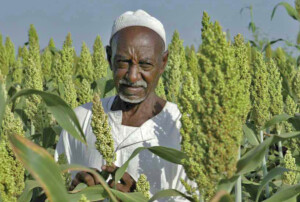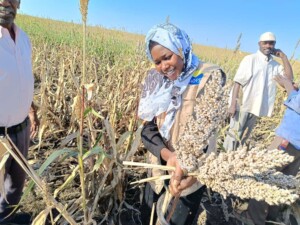Farmers in Sudan’s Northern State warn of the failure of the current agricultural season due to the lack of tools, the lack of inputs of seeds and fertilisers, and the scarcity and high price of fuel.
The Northern State Resistance Committees Coordination said in a statement yesterday that the policies of the Ministry of Finance have doubled electricity tariffs for the agricultural sector. Sale of wheat crops has stagnated as the Ministry of Finance has refused to buy it at a good price, meaning farmers have incurred heavy losses. Unprepared food storage facilities have also led to crop damage.
According to the statement, “these policies aim to destroy the agricultural sector in the state, and threaten farmers with insolvency, which leads them to abandon agriculture and emigrate outside of the state”.
Farmers also fear that the state will take over their abandoned land to sell it to foreign investors. In December 2018, Saudi Arabia and Sudan launched an agricultural partnership to develop agricultural work, attain benefits for Sudanese farmers, and fulfil the needs of Arab citizens.
The resistance committees' statement demanded the formation of new farmers union branches in Northern State “to save the agricultural season from failing and the agricultural sector in the state from collapse”.
In August 2020, villagers in El Golid locality in Northern State organised a protest vigil in front of the state government secretariat in Dongola, demanding the restitution of their lands that were taken from them to be turned into foreign investment projects during the 30-year reign of President Omar Al Bashir.
Last year, the federal Ministry of Finance planned a significant increase in electricity prices for 2022, as it decided to continue with lifting subsidies on consumer goods, in order to meet the demands of the World Bank. In early January 2021, the power tariffs already increased by 500 per cent.
Northern Sudanese farmers told Radio Dabanga in January that the increase in electricity prices would affect agriculture in Nile River state and Northern State. They warned authorities of the failure of the current agricultural season if they did not cancel these increases, especially the upcoming wheat harvest, which needs to be irrigated. Sudan is struggling to manage its water resources amidst political turmoil and an economic slump.
The UN Office for the Coordination of Humanitarian Aid (OCHA) in Sudan recently reported that the number of Sudanese in need of humanitarian assistance will rise to 15.8 million next year, equivalent to about a third of the population.
'Disastrous agricultural season'
At the beginning of the agricultural season, in June, farmers in El Gezira said that farming in Sudan had become “a leap in the dark” due to the soaring production costs and increased taxes. Last month, Radio Dabanga reported that they are facing “one of the worst agricultural seasons experienced in Sudan”.
Yesterday, AFSA, Africa’s largest civil society organisation representing more than 200 million land workers across the continent, suggested “integrating agroecology into regional and national climate policy spaces.”
Just three per cent of international public climate finance goes to food systems, and even less to small-scale producers, according to the Global Alliance for the Future of Food: “Small-scale farmers are doing everything they can to adapt, but they need support and climate finance.”
 Protestors call for compensation for farmlands in the capital of Northern State, Dongola in August 2020 (Photo: RD)
Protestors call for compensation for farmlands in the capital of Northern State, Dongola in August 2020 (Photo: RD)










 and then
and then